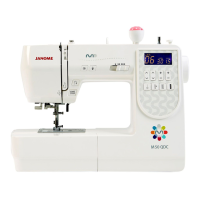14
CAUTION:
Turn OFF the power switch before changing the
needle.
Raise the needle to its highest position by turning the
handwheel counterclockwise, and lower the presser foot.
A loose needle or a loose screw may cause machine
malfunction or needle to break.
Changing the Needle
q
w
Fabric Thread Needle
Fine
Lawn
Georgette
Tricot
Organza
Crepe
Silk #80-100
Cotton #80-100
Synthetic #80-100
#9/65-11/75
Blue tip needle
Medium
Sheeting
Jersey
Broadcloth
Fleece
Silk #50
Cotton #50-80
Synthetic #50-80
#11/ 75 -14/9 0
Heavy
weight
Denim
Tweed
Coating
Quilting
Silk #30-50
Cotton #40-50
Synthetic #40-50
#14/90-16/100
Fabric and Needle Chart
• For general sewing, use needle size 11/75 or 14/90.
• A ne thread and needle should be used for sewing
lightweight fabrics, so the fabric will not be marred.
• Heavy fabrics require a needle large enough to pierce
the fabric without fraying the needle thread.
• Always test the needle size on a small scrap of the
fabric that will be used for actual sewing.
• In general, use the same thread for the needle and
bobbin.
• When sewing stretch fabrics, very ne fabrics and
synthetics, use a blue tip needle. The blue tip needle
effectively prevents skipped stitches.
NOTE:
1 x blue tip needles (#11/75), 2 x #11/75 needles and 2
x #14/90 needles are included in the needle case
(Part No. 540401026).
Loosen the needle clamp screw q by turning it
counterclockwise. Remove the needle from the needle
clamp.
Insert a new needle into the needle clamp with the at
side w to the rear. When inserting the needle into the
needle clamp, push it up as far as it will go.
Tighten the needle clamp screw q rmly by turning it
clockwise.
q Needle clamp screw
w Flat side
To see if the needle is in good condition, place the at
side of the needle onto something at (needle plate, glass
etc.). The gap between the needle and the at surface
should be consistent. Never use a bent or blunt needle.
A damaged needle can cause permanent snags or runs
in knits, ne silks and silk-like fabrics.

